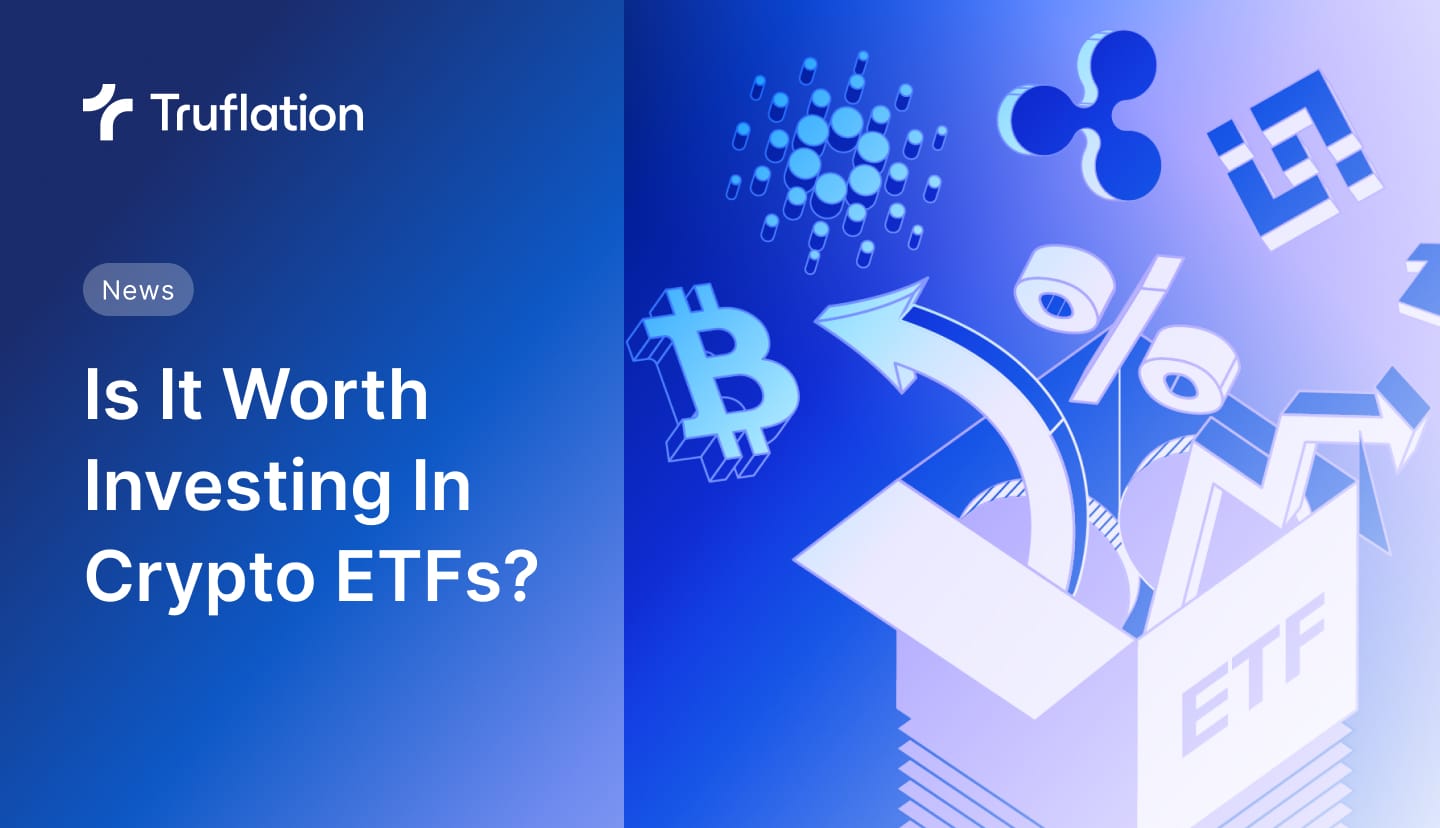Is It Worth Investing In Crypto ETFs?

After the approval of the spot bitcoin exchange-traded fund (ETF) last week by the Securities and Exchange Commission (SEC), questions about investing in crypto ETFs are on everybody’s lips. Crypto native investors want to know whether spot bitcoin ETFs will bring billions of inflows into the decentralized ecosystem. Meanwhile, those new to bitcoin are asking if they should include a crypto index fund into their balanced portfolios and, if so, how much should they allocate?
Bitcoin and other cryptocurrencies could be a fitting addition to a diversified investment portfolio. However, with the growing number of options now available to gain exposure to this asset class, it’s worth considering the pros and cons of investing in crypto ETFs. Let’s delve into this topic in more detail.
Cryptocurrency ETFs or direct investment?
Which investment asset might be right for you depends on what type of investor you are and your risk appetite. For those interested in cryptocurrencies, there are over 20,000 crypto tokens, making it a complex market for newbies coming into crypto. However, bitcoin and ethereum could be a good place to start for investors looking to dip their toes into digital assets. Following the spot bitcoin ETF approval, crypto ETFs could be one avenue to explore to gain this exposure.
However, learning how to navigate crypto self-custody tools and decentralized finance could also be beneficial. These tools put the responsibility in the hands of the individual rather than relying on a third party to look after the funds. However, self-custody may not be for everyone due to the knowledge and expertise it requires and the other risks involved, including the risk of fraud.
READ: Decentralized Exchanges are Transforming the Future of Finance
For investors looking for exposure beyond bitcoin, some interesting on-chain indexes provide access to bigger, thematic token portfolios. This could be a more secure, diversified option for those looking to invest in a crypto ETF in a decentralized manner without taking on self-custody risk.
Advantages and disadvantages of investing in crypto ETFs
There are tens of thousands of tokens to choose from beyond just bitcoin and that can be intimidating for new investors. For those who don’t have the time or inclination to learn the ins and outs of crypto, an exchange-traded fund run by the world’s biggest asset manager could be an attractive option.
However, bitcoin, ethereum, and other cryptocurrencies can also be bought directly via crypto exchanges or decentralized platforms. The advantage of this option is that these crypto-assets can then be held off-exchange in a cold wallet, removing third-party risk. However, an investor would have to be prepared to take on self-custody risk instead.
READ: Tokenizing Commodities and Traditional Markets
Another passive crypto investment option is to allocate to a theme. For example; gaming, decentralized finance lending, or AI data. This could be a way to play different themes in the cryptocurrency industry and at the same time learn about tokens and how they work. However, it’s important to never invest assets you can’t afford to lose in any cryptocurrency projects and always conduct thorough research.
Custody solutions for a crypto ETF versus individual coins
In the traditional finance world, several custodians will hold the tokens on behalf of a crypto ETF. This is a standard systemic practice across the entire traditional financial industry. However, in crypto, it’s likely to be a crypto business like Coinbase Pro rather than State Street, that provides custodian services.
If you aren’t looking after your coins, it means your keys and coins are sitting with an outside custodian (not your keys, not your coins). So it’s important to ensure that the custodian who is keeping your assets for you is reputable and has strong security in place.
Alt text for the image: crypto ETF expense ratio post spot bitcoin ETF approval
On the blockchain, custody is held in smart contracts that are tied to a unique wallet and linked to specifications that are maintained by the smart contract itself. While the technology is not without its faults, this does remove third-party risk. Ultimately, it’s up to the individual investor which risks they are willing to take on and how involved they want to become in the crypto ecosystem – luckily, the spot bitcoin ETF now provides this choice.
Crypto ETFs vs direct investment: what’s the verdict?
If you want to invest directly, and you are willing to go down the self-custody route, then it would be advisable to first do your research and start with very small amounts of money. However, for those who do have the time to invest, learning about the crypto ecosystem could be rewarding. If you don’t have the time to explore the decentralized finance ecosystem, consider centralized exchanges like Coinbase or Kraken or investing via a crypto ETF.
READ: Why We Use Blockchain Tech
When it comes to strategy, spreading your investment across a wider range of crypto assets could help reduce the volatility and risk exposure associated with a single crypto asset (although all cryptocurrencies tend to be highly volatile). However, don’t forget that crypto is still such a fast-growing and diverse market that many different factors need to be taken into consideration when investing in any token. As a result, a single token strategy, like a bitcoin investment, could be a more suitable option for someone looking to add a small satellite exposure to crypto in their portfolio.
If this is the type of exposure you’re looking for, investing in cryptocurrency ETFs provides the convenience factor that self-custody solutions do not. All that’s required is a traditional fund investment platform. A crypto ETF could also be the only option available to investors who are subject to compliance restrictions, such as pension funds. Ultimately, it’s an individual decision that will depend on many factors that must be considered carefully before diving into the weird and wonderful world of crypto.
Want to join the data revolution? Explore Truflation’s indexes and data feeds!

